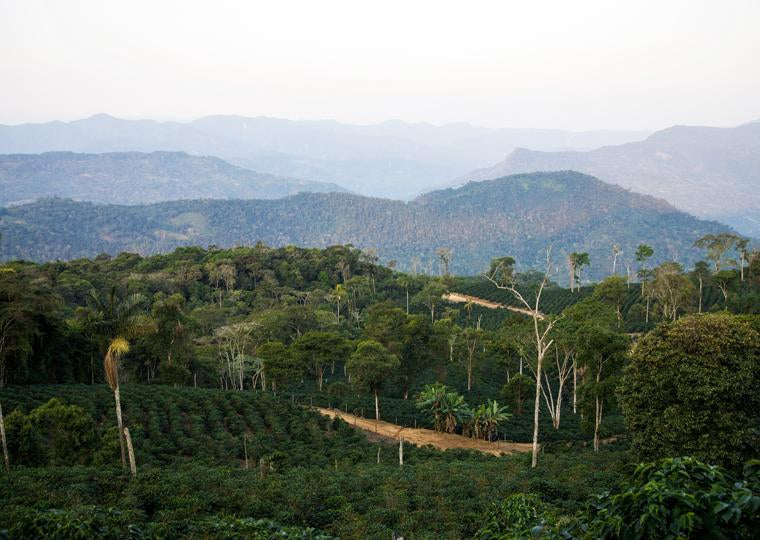We’re always super excited when a new batch of beautiful Bolivian coffees that we’ve carefully selected arrives in Australia.
Once it does, it’s our job to roast and taste them, and then serve these coffees and offer them as bagged beans to our wonderful customers.
We absolutely adore Bolivian coffees. There are a few reasons why. The first is the most obvious: the taste. Coffees from Bolivia are absolutely spectacular. They tend to be sweet and clean in the cup, and a number of special varieties, such as gesha and java, thrive in the Bolivian soil and climate in a way they don’t elsewhere.
One reason that Bolivian coffees taste so good is the country’s unique climate and altitude. Bolivian coffees are some the highest altitude and lowest latitude coffees produced in the world. The micro climates found in the Yungas and Samaipata regions, from which we source a number of coffees, are well suited to high quality coffee production, with rich soil, very high altitudes and a wide daily temperature ranges. In addition, the region’s remoteness has also meant that hybrid coffee varieties have not been introduced and, as a result, there are an abundance of high-quality typica and caturra varieties that are known for their exceptional flavour.
The coffees we source from Bolivia come a group of very dedicated producers, many of whom own very small pockets of land – often only a couple of hectares each – and produce a handful of bags of coffee a year. Often, these farmers work with their neighbours, in order to produce enough specialty coffee for export and to ensure that their output is sustainable.
Bolivian coffee is somewhat endangered, and we can’t take it for granted. Coffee production in Bolivia has always been very small. When we first started sourcing from Bolivia in 2010, annual exports were around 74,000 bags. (To put that in perspective, that’s equivalent to the annual output of one large farm in Brazil.) Over the last few years, however, Bolivian production has more than halved (In 2020, production was 22,000 bags).
There are several factors contributing to this decline. One is that coffee competes with the local coca industry (grown for the drug trade) which harvests all year round, is easier to pick and often yields higher profits for farmers. In the long term, the coca plantations have a devastating impact on the communities and the land; untouched rainforest is often illegally destroyed to plant coca, and a lack of shade trees leads to huge problems with erosion. The excessive use of biocides by coca producers – in an effort to bolster their crops – also renders the soil infertile over time. The land is then abandoned as nothing else can be grown there.
The absence of a centralised body that supports and promotes coffee production also threatens the vitality of the coffee trade in Bolivia. Unlike in other coffee-producing countries such as Guatemala and Brazil, coffee producers in Bolivia receive no support from the government or national agricultural bodies. Historically, a lot of support was given to Bolivian coffee by the US (in an attempt to encourage the growth of alternative crops to coca) but when President Evo Morales (himself an ex-coca grower) came in to power in 2006, he soon stopped all US aid to his country.
These factors, along with poor infrastructure, changing climate conditions, the presence of roya (leaf rust) and traditional, less sophisticated farming practices have led to a significant decrease in production over the past decade.
Don’t despair though! There is still hope for the future of coffee in Bolivia, thanks largely to the vision, determination and hard work of a man named Pedro Rodriguez. Pedro entered the coffee industry over three decades ago, and has has worked tirelessly to build the production of, and market for, Bolivian specialty coffee.
With a young, dynamic and passionate team, including his daughter Daniela and son Pedro Pablo, Pedro has built an impressive business called Agricafe, which focuses on building long-term relationships with producers, based on mutual trust and benefit. Today Agricafe represents over 200 producers, whose farms average 2–5 hectares in size. It also runs a training program, called Sol de la Mañana, which focuses on giving dedicated producers the training and skills they need to establish efficient, sustainable and profitable coffee farms.
In recent years, Agricafe has also taken a bigger role in growing coffee. The family now owns 12 farms that come under the banner of "Fincas Los Rodriguez". In addition to guaranteeing a healthy supply of delicious coffees, these farms have been a powerful tool in demonstrating to local smallholders what can be achieved with the application of modern farming techniques. These learnings have been shared with the Sol de La Mañana producers, who are now emulating the Los Rodriguez approach to coffee farming. The results have been profound, with significant improvements in quality, productivity and profitability.
At Market Lane, we’ve been working with Pedro and his family every year since 2010, and aim to buy coffee from the same Sol de La Mañana producers, along with a selection of lots from the Los Rodríguez farms. And every year when we visit them, we are blown away by their determination and commitment to ensuring there is a future for speciality coffee in Bolivia. They care deeply about quality coffee, about the producers they work with, and about creating a sustainable future for this industry.
And we are right there with them! The coffee in Bolivia is way too special, delicious and close to our hearts to let it disappear. We want to continue our relationships with producers, and to discover new producers and coffees as well. By establishing relationships, paying higher prices and and supporting those who support the specialty coffee industry, we hope that, in time, a more sustainable future is built for coffee in Bolivia.






